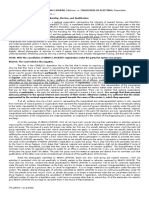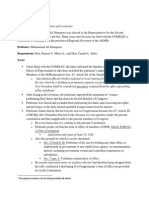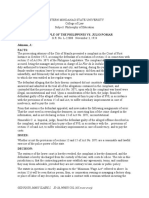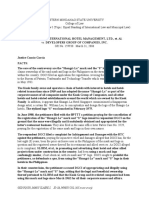0 ratings0% found this document useful (0 votes)
36 viewsAlbayon VS COMELEC Case Digest
Albayon VS COMELEC Case Digest
Uploaded by
CL GeduquioPetitioner Abayon was the first nominee of the Aangat Tayo party-list that won a seat in the House of Representatives in 2007. Respondents filed a petition claiming Aangat Tayo was not eligible and Abayon was not qualified. The Court affirmed the House Electoral Tribunal's (HRET) jurisdiction over the qualifications of party-list nominees. While party-lists initially screen nominees, HRET has sole authority to determine if a disqualified representative was chosen. The Constitution provides for party-list representation, where voters elect organizations and parties rather than specific candidates.
Copyright:
© All Rights Reserved
Available Formats
Download as DOCX, PDF, TXT or read online from Scribd
Albayon VS COMELEC Case Digest
Albayon VS COMELEC Case Digest
Uploaded by
CL Geduquio0 ratings0% found this document useful (0 votes)
36 views2 pagesPetitioner Abayon was the first nominee of the Aangat Tayo party-list that won a seat in the House of Representatives in 2007. Respondents filed a petition claiming Aangat Tayo was not eligible and Abayon was not qualified. The Court affirmed the House Electoral Tribunal's (HRET) jurisdiction over the qualifications of party-list nominees. While party-lists initially screen nominees, HRET has sole authority to determine if a disqualified representative was chosen. The Constitution provides for party-list representation, where voters elect organizations and parties rather than specific candidates.
Original Description:
.
Copyright
© © All Rights Reserved
Available Formats
DOCX, PDF, TXT or read online from Scribd
Share this document
Did you find this document useful?
Is this content inappropriate?
Petitioner Abayon was the first nominee of the Aangat Tayo party-list that won a seat in the House of Representatives in 2007. Respondents filed a petition claiming Aangat Tayo was not eligible and Abayon was not qualified. The Court affirmed the House Electoral Tribunal's (HRET) jurisdiction over the qualifications of party-list nominees. While party-lists initially screen nominees, HRET has sole authority to determine if a disqualified representative was chosen. The Constitution provides for party-list representation, where voters elect organizations and parties rather than specific candidates.
Copyright:
© All Rights Reserved
Available Formats
Download as DOCX, PDF, TXT or read online from Scribd
Download as docx, pdf, or txt
0 ratings0% found this document useful (0 votes)
36 views2 pagesAlbayon VS COMELEC Case Digest
Albayon VS COMELEC Case Digest
Uploaded by
CL GeduquioPetitioner Abayon was the first nominee of the Aangat Tayo party-list that won a seat in the House of Representatives in 2007. Respondents filed a petition claiming Aangat Tayo was not eligible and Abayon was not qualified. The Court affirmed the House Electoral Tribunal's (HRET) jurisdiction over the qualifications of party-list nominees. While party-lists initially screen nominees, HRET has sole authority to determine if a disqualified representative was chosen. The Constitution provides for party-list representation, where voters elect organizations and parties rather than specific candidates.
Copyright:
© All Rights Reserved
Available Formats
Download as DOCX, PDF, TXT or read online from Scribd
Download as docx, pdf, or txt
You are on page 1of 2
WESTERN MINDANAO STATE UNIVERSITY
College of Law
Subject: Constitutional law 1 (Topic: Partylist Representation)
DARYL GRACE ABAYON VS THE HONORABLE HOUSE OF REPRESENTATIVES
G.R. No. 189466 February 11, 2010
Justice Abad
FACTS:
Petitioner Abayon is the first nominee of the Aangat Tayo party-list organization that won a seat in the
House of Representatives during the 2007 elections. Respondents Perfecto C. Lucaban, Jr., et.al. filed a
petition for quo warranto with respondent HRET against Aangat Tayo and its nominee. They claimed
that Aangat Tayo was not eligible for a party-list seat in the House of Representatives, since it did not
represent the marginalized and underrepresented sectors, and that Abayon is not qualified.
Abayon countered that the Commission on Elections (COMELEC) had already confirmed the status of
Aangat Tayo as a national multi-sectoral party-list organization representing the workers, women, youth,
urban poor, and elderly and that she belonged to the women sector. Abayon also claimed that although
she was the second nominee of a Waray party-list organization during the 2004 elections, she could not
be regarded as having lost a bid for an elective office. Finally, petitioner Abayon pointed out that
respondent HRET had no jurisdiction over the petition for quo warranto since respondent Lucaban and
the others with him collaterally attacked the registration of Aangat Tayo as a party-list organization, a
matter that fell within the jurisdiction of the COMELEC. All questions regarding her qualifications shall
be internal concerns of Aangat Tayo.
ISSUES:
Whether or not the House of Representatives Electoral Tribunal has jurisdiction over the qualifications of
the partylist nominees.
HELD:
YES. The Court DISMISSES the consolidated petitions and AFFIRMS the Order dated July 16, 2009
and Resolution 09-183 dated September 17, 2009 in HRET. The Court holds that respondent HRET did
not gravely abuse its discretion when it dismissed the petitions for quo warranto against Aangat Tayo
party-list and Bantay party-list but upheld its jurisdiction over the question of the qualifications of
petitioners Abayon and Palparan.
RULLING:
The initial screening of nominees is conducted by the party or organization that nominates them,
however, if there are allegations that the party has chosen and allowed a disqualified representative, the
HRET shall be the sole judge.
It is not the organization that sits as and becomes the member of the House of representatives, but the
elected member of the partylist. Section 5, Article VI of the Constitution states that a member of the
House of Representatives may be elected through a party-list system of registered national, regional, and
sectoral parties or organizations.
These representatives are elected, however, through that peculiar party-list system that the Constitution
authorized and that Congress by law established where the voters cast their votes for the organizations or
parties to which such party-list representatives belong.
GEDUQUIO, MARY CLAIRE I. JD-IA, WMSU COL (AY 2022-2023)
GEDUQUIO, MARY CLAIRE I. JD-IA, WMSU COL (AY 2022-2023)
You might also like
- KKTP Bahasa Indonesia Kelas IiiDocument7 pagesKKTP Bahasa Indonesia Kelas IiiNiko pratama100% (1)
- US History Regents Review Packet Study GuideDocument45 pagesUS History Regents Review Packet Study GuideAaronNo ratings yet
- David VS MacapagalDocument12 pagesDavid VS Macapagalarden1imNo ratings yet
- Bacani Vs NACOCODocument5 pagesBacani Vs NACOCORon AceNo ratings yet
- 3 7 RD Design Report TemplateDocument2 pages3 7 RD Design Report TemplateDaramola AyotopeNo ratings yet
- Tinio v. DuterteDocument33 pagesTinio v. DuterteEvan LoirtNo ratings yet
- Sarmiento Vs COMELEC G.R. No. 105628 August 06, 1992 FactsDocument3 pagesSarmiento Vs COMELEC G.R. No. 105628 August 06, 1992 Factsknicky FranciscoNo ratings yet
- Eastern Shipping Lines vs. POEA, 166 SCRA 533, G.R. No. L-76633, October 18, 1988Document11 pagesEastern Shipping Lines vs. POEA, 166 SCRA 533, G.R. No. L-76633, October 18, 1988JemNo ratings yet
- Pormento v. Estrada, 629 SCRA 530 (2010)Document1 pagePormento v. Estrada, 629 SCRA 530 (2010)Jasper BagniNo ratings yet
- Francisco vs. House of Representatives Case DigestDocument4 pagesFrancisco vs. House of Representatives Case DigestEmma Ruby Aguilar-ApradoNo ratings yet
- Gozo Vs The PhilippinesDocument2 pagesGozo Vs The PhilippinesAljenneth MicallerNo ratings yet
- Akbayan VS ComelecDocument17 pagesAkbayan VS ComelecMaria Celiña PerezNo ratings yet
- Areola vs. MendozaDocument2 pagesAreola vs. MendozaSheila RosetteNo ratings yet
- PEOPLE V. ANDRE MARTI G.R. No. 81561 January 18, 1991 FactsDocument4 pagesPEOPLE V. ANDRE MARTI G.R. No. 81561 January 18, 1991 FactsAlelojo, NikkoNo ratings yet
- Revised Penal C OdeDocument3 pagesRevised Penal C OdeDah Rin CavanNo ratings yet
- Topic: Privilege of The Writ of Habeas Corpus - Writ of Habeas DataDocument2 pagesTopic: Privilege of The Writ of Habeas Corpus - Writ of Habeas DataLuna BaciNo ratings yet
- Comparison Article 102 & 129Document2 pagesComparison Article 102 & 129Ryan BalladaresNo ratings yet
- Hidalgo Vs MarcosDocument3 pagesHidalgo Vs MarcosJezen Esther PatiNo ratings yet
- Bengzon v. DrilonDocument2 pagesBengzon v. DrilonRafNo ratings yet
- ABANG LINGKOD PARTY-LIST V COMELECDocument1 pageABANG LINGKOD PARTY-LIST V COMELECChilzia RojasNo ratings yet
- Narratives: Constitutional Law IIDocument13 pagesNarratives: Constitutional Law IIitsmestephNo ratings yet
- Bello V COMELECDocument5 pagesBello V COMELECsai_bautista_1No ratings yet
- (Case No. 336) : Prepared By: Cecille Diane DJ. MangaserDocument2 pages(Case No. 336) : Prepared By: Cecille Diane DJ. MangaserCecille MangaserNo ratings yet
- IN RE JUDGE RODOLFO MANZANO A.M. No. 88-7-1861-RTCDocument2 pagesIN RE JUDGE RODOLFO MANZANO A.M. No. 88-7-1861-RTCtimkangjelian2021No ratings yet
- PSA Birth Certificate Assistance 1Document22 pagesPSA Birth Certificate Assistance 1Jurie FernandezNo ratings yet
- 33-A in The Matter of The Petition For The Writ of Amparo and Habeas Data in Favor of Noriel H. RodriguezDocument1 page33-A in The Matter of The Petition For The Writ of Amparo and Habeas Data in Favor of Noriel H. Rodriguezmayton30No ratings yet
- Bondoc Vs PinedaDocument2 pagesBondoc Vs PinedaFeBrluadoNo ratings yet
- Dimaporo v. MitraDocument2 pagesDimaporo v. Mitraalexis_beaNo ratings yet
- Ligaya Gapusan-Chua Vs CADocument5 pagesLigaya Gapusan-Chua Vs CAXtine CampuPotNo ratings yet
- Case Digest For AEL 6 20Document29 pagesCase Digest For AEL 6 20Francess Mae AlonzoNo ratings yet
- Mary Grace Natividad S. Poe-Llamanzares G.R. No. 221697 March 8, 2016Document1 pageMary Grace Natividad S. Poe-Llamanzares G.R. No. 221697 March 8, 2016Kyle BuenbrazoNo ratings yet
- PHILCOMSAT Vs SenateDocument2 pagesPHILCOMSAT Vs Senateanon_421571815No ratings yet
- Philcomsat Vs SenateDocument1 pagePhilcomsat Vs SenateJebellePuracanNo ratings yet
- Case Digest - SumagkaDocument2 pagesCase Digest - SumagkaGom BearNo ratings yet
- Ang Bagong Bayani-OfW Labor Party vs. Commission On Elections, 359 SCRA 698, G.R. No. 147589, G.R. No. 147613 June 26, 2001Document64 pagesAng Bagong Bayani-OfW Labor Party vs. Commission On Elections, 359 SCRA 698, G.R. No. 147589, G.R. No. 147613 June 26, 2001Alexiss Mace JuradoNo ratings yet
- Crimpro MTDocument34 pagesCrimpro MTRODNA JEMA GREMILLE RE ALENTONNo ratings yet
- Bondoc v. Pineda DigestDocument7 pagesBondoc v. Pineda DigestdondzNo ratings yet
- 185 ResolutionDocument3 pages185 ResolutionavaniNo ratings yet
- DIGEST PH Vs Migrino and TecsonDocument22 pagesDIGEST PH Vs Migrino and TecsonMykee AlonzoNo ratings yet
- PP V MagallanesDocument16 pagesPP V MagallanesJD DXNo ratings yet
- 53 1-UTAK v. COMELECDocument4 pages53 1-UTAK v. COMELECJul A.No ratings yet
- People vs. Carreon, G.R. No. 229086Document15 pagesPeople vs. Carreon, G.R. No. 229086Ran NgiNo ratings yet
- Vilando Vs HretDocument7 pagesVilando Vs HretIvan CubeloNo ratings yet
- 49 Scra 105Document2 pages49 Scra 105Johnny EnglishNo ratings yet
- Consti Executive 1Document8 pagesConsti Executive 1Aria LimNo ratings yet
- 1 Laureta V Maravilla 148 SCRA 382Document4 pages1 Laureta V Maravilla 148 SCRA 382Edwino Nudo Barbosa Jr.No ratings yet
- ACCFA vs. Federation of Labor UnionDocument1 pageACCFA vs. Federation of Labor UnionDi ko alamNo ratings yet
- Arnault Vs Balagtas (1955)Document4 pagesArnault Vs Balagtas (1955)trina tsaiNo ratings yet
- Chapter 11 Section 1 Comparing The Justinian Code To Contemporary LawDocument9 pagesChapter 11 Section 1 Comparing The Justinian Code To Contemporary Lawapi-206809924No ratings yet
- 565 Perez v. COMELECDocument1 page565 Perez v. COMELECMona Liza Sulla PerezNo ratings yet
- ArlinObiasca v. JeaneBasallote, G.R. No. 176707, February 17, 2010Document23 pagesArlinObiasca v. JeaneBasallote, G.R. No. 176707, February 17, 2010Estel Tabumfama0% (1)
- Narag Vs NaragDocument2 pagesNarag Vs NaragMagr EscaNo ratings yet
- People Vs CabalquintoDocument6 pagesPeople Vs CabalquintoUc ItlawNo ratings yet
- MORALES VS SUBIDO GR No L-29658 1969-02-27Document5 pagesMORALES VS SUBIDO GR No L-29658 1969-02-27Cheala ManagayNo ratings yet
- Bonifacio V Judge DizonDocument1 pageBonifacio V Judge DizonJonalyn BazarNo ratings yet
- Go+tek+vs +deportation+boardDocument1 pageGo+tek+vs +deportation+boardaj salazarNo ratings yet
- A.C. No. 13504-Maria Cristina G. Dayos vs. Atty. Grace C. BuriDocument2 pagesA.C. No. 13504-Maria Cristina G. Dayos vs. Atty. Grace C. Burilaila lasamNo ratings yet
- Al Haj V Comelec, GR No.151046Document2 pagesAl Haj V Comelec, GR No.151046Jericho UyNo ratings yet
- Sotto Vs COMELEC GR L - 329Document1 pageSotto Vs COMELEC GR L - 329Baisy VillanozaNo ratings yet
- Abayon Vs HRET, G.R. No.189466, February 11, 2010, 612 SCRA 375Document6 pagesAbayon Vs HRET, G.R. No.189466, February 11, 2010, 612 SCRA 375Agnes FranciscoNo ratings yet
- Abayon v. HRET: Petitioners: RespondentsDocument3 pagesAbayon v. HRET: Petitioners: RespondentsCarl SantosNo ratings yet
- Joker Arroyo Vs HRETDocument7 pagesJoker Arroyo Vs HRETDomingo FyNo ratings yet
- Abayon Vs HretDocument2 pagesAbayon Vs HretKenneth John Jayme75% (4)
- People VS PomarDocument2 pagesPeople VS PomarCL GeduquioNo ratings yet
- Bolos VS Bolos (Civil-VerbaLegis)Document5 pagesBolos VS Bolos (Civil-VerbaLegis)CL GeduquioNo ratings yet
- Republic VS PLDTDocument2 pagesRepublic VS PLDTCL GeduquioNo ratings yet
- Quintos-Deles VS CA-CDDocument2 pagesQuintos-Deles VS CA-CDCL GeduquioNo ratings yet
- Tallado Vs ComelecDocument2 pagesTallado Vs ComelecCL GeduquioNo ratings yet
- Benigno Aquino III VS Comelec Case DigestDocument2 pagesBenigno Aquino III VS Comelec Case DigestCL GeduquioNo ratings yet
- Shangri-La VS Developers Case DigestDocument2 pagesShangri-La VS Developers Case DigestCL GeduquioNo ratings yet
- Ramiscal VS Sandiganbayan Case DigestDocument2 pagesRamiscal VS Sandiganbayan Case DigestCL Geduquio100% (1)
- RescissionDocument3 pagesRescissionAdi KkncNo ratings yet
- Paper1: SECTION-A: Q1 (Compulsory) Answer The Following Questions in About 150 Words Each: 10 X 5 50 MarksDocument6 pagesPaper1: SECTION-A: Q1 (Compulsory) Answer The Following Questions in About 150 Words Each: 10 X 5 50 MarksHarsha DeepakNo ratings yet
- Taiga by John ReyDocument20 pagesTaiga by John ReyNiña AmatoNo ratings yet
- Official Rules - The - Fourteenth - NLU - Antitrust Law - Moot - Competition - 2023Document20 pagesOfficial Rules - The - Fourteenth - NLU - Antitrust Law - Moot - Competition - 2023Sadhika GuptaNo ratings yet
- Xi. AdoptionDocument18 pagesXi. AdoptionUst LegMa SocNo ratings yet
- 100% INSTANT RESULTS SPELLS CASTER +256779317397, Love, Marriage, Divorce & Fertility SpellsDocument2 pages100% INSTANT RESULTS SPELLS CASTER +256779317397, Love, Marriage, Divorce & Fertility SpellsProf MuuzaNo ratings yet
- Garbage CrisisDocument7 pagesGarbage Crisiszeeshan aliNo ratings yet
- Dignity and Self RespectDocument5 pagesDignity and Self RespectSilvia ARNo ratings yet
- Definition of Invitation: Is A Request To Participate or Take A Present in An EventDocument12 pagesDefinition of Invitation: Is A Request To Participate or Take A Present in An EventKrismiati SumardiNo ratings yet
- AAR Flag Raising CeremonyDocument5 pagesAAR Flag Raising CeremonyRk NaretoNo ratings yet
- Portfolio 1Document2 pagesPortfolio 1Clare GandezaNo ratings yet
- Session 1Document37 pagesSession 1Abhijit SinhaNo ratings yet
- Nirvana XO Issue 13Document77 pagesNirvana XO Issue 13fatsoncreditNo ratings yet
- LBH-222 Company Law PDFDocument2 pagesLBH-222 Company Law PDFChaudharybanaNo ratings yet
- Shayetet 13 - WikipediaDocument14 pagesShayetet 13 - WikipediaJohn KonstantaropoulosNo ratings yet
- Bad GirlDocument2 pagesBad GirlHanna NeriNo ratings yet
- Maquiling v. Comelec, G.R. No. 195649, April 16, 2013Document47 pagesMaquiling v. Comelec, G.R. No. 195649, April 16, 2013DodongNo ratings yet
- Obli Finals Quiz 1Document13 pagesObli Finals Quiz 1KingNo ratings yet
- Witchcraft Used Anda Rare BooksDocument32 pagesWitchcraft Used Anda Rare BooksLorenna Escobar0% (1)
- Economics - Course SyllabusDocument2 pagesEconomics - Course SyllabusGemma SteveNo ratings yet
- Election Manifesto of Bangladesh Awami League-2008Document15 pagesElection Manifesto of Bangladesh Awami League-2008api-37090980% (1)
- Tuberculosis-Reflection PaperDocument2 pagesTuberculosis-Reflection Paperjoycamajalan2005No ratings yet
- INDU1106 - Module Handbook - 202324Document19 pagesINDU1106 - Module Handbook - 202324Bop Bi BauNo ratings yet
- Annual General Meeting of Pta FinalDocument13 pagesAnnual General Meeting of Pta FinalAnkur JoshiNo ratings yet
- MGF MG TF: All The Parts You NeedDocument164 pagesMGF MG TF: All The Parts You NeedMartin BradfordNo ratings yet
- Eimi Weekly Vol 3 No 31Document2 pagesEimi Weekly Vol 3 No 31officena officenaNo ratings yet
- BOB Final Advertisement 2018 19 PDFDocument29 pagesBOB Final Advertisement 2018 19 PDFSandeep Reddy DepaNo ratings yet

































































































